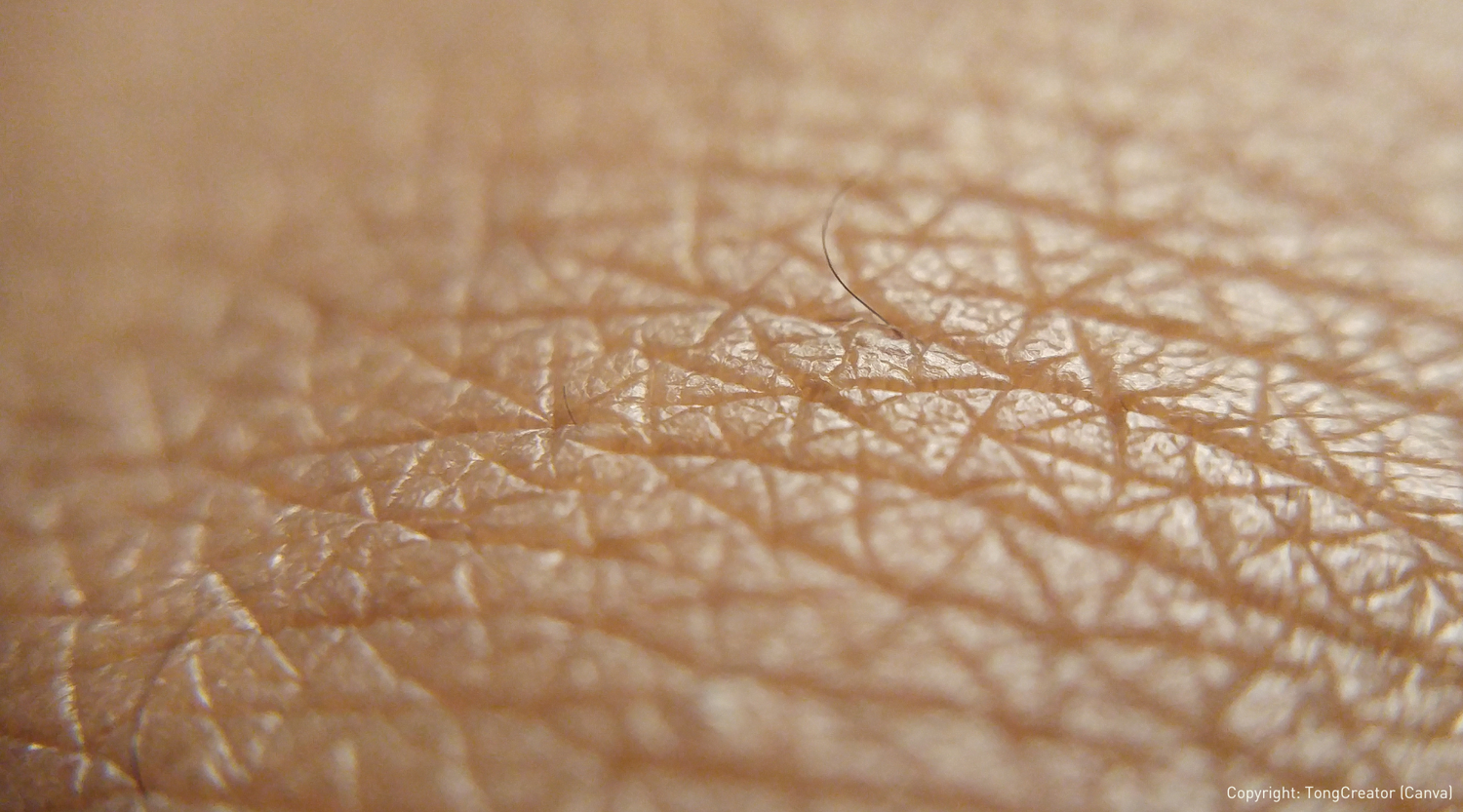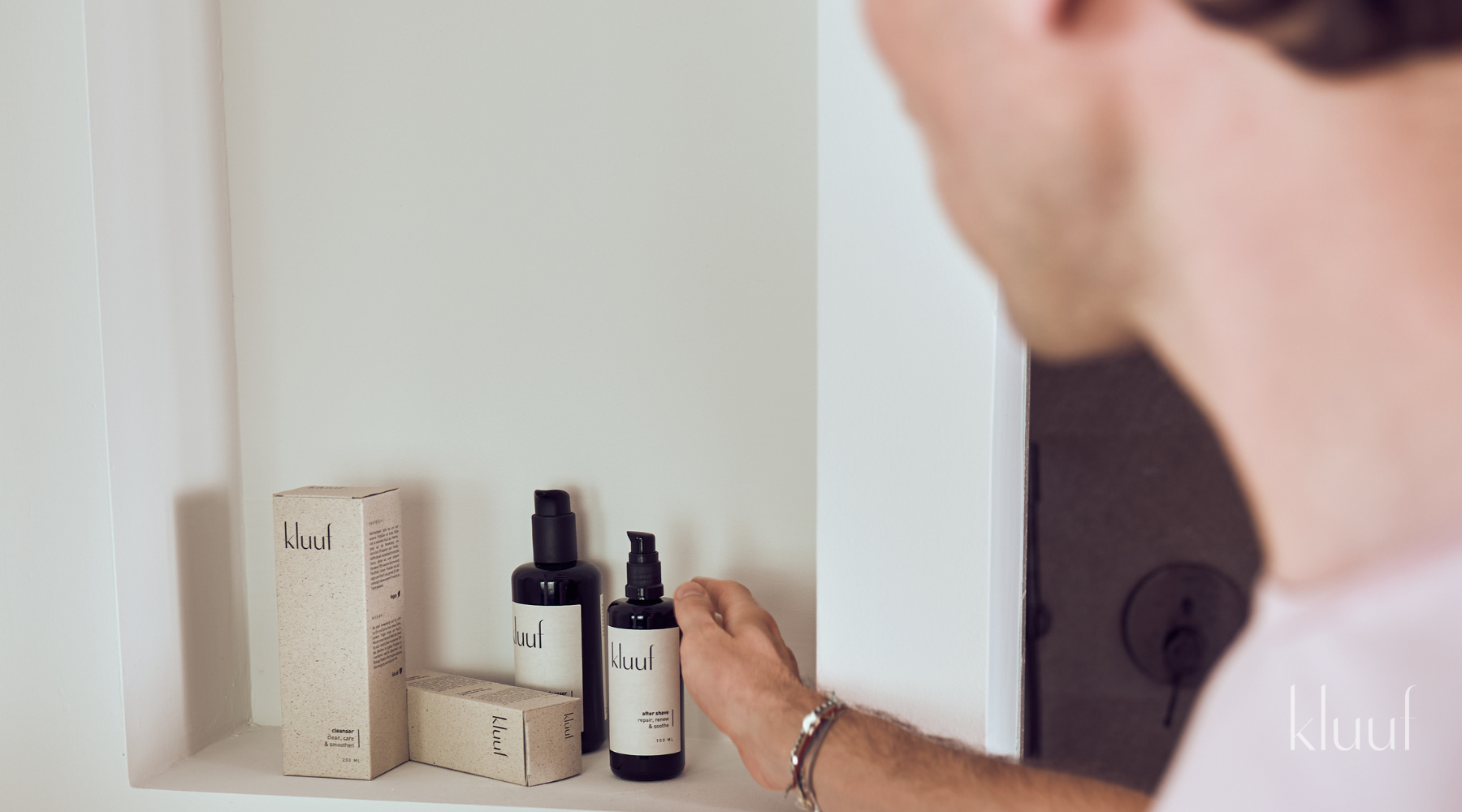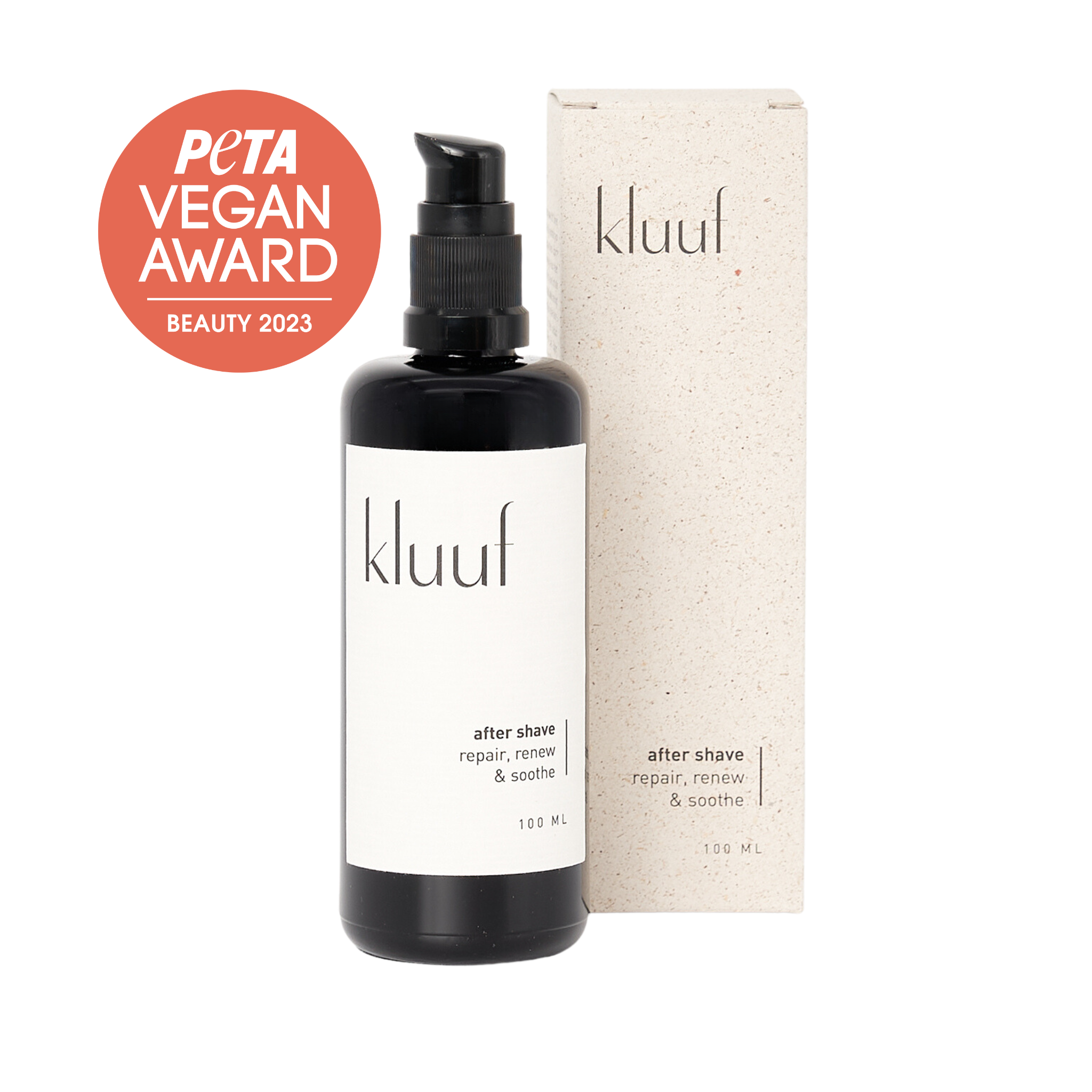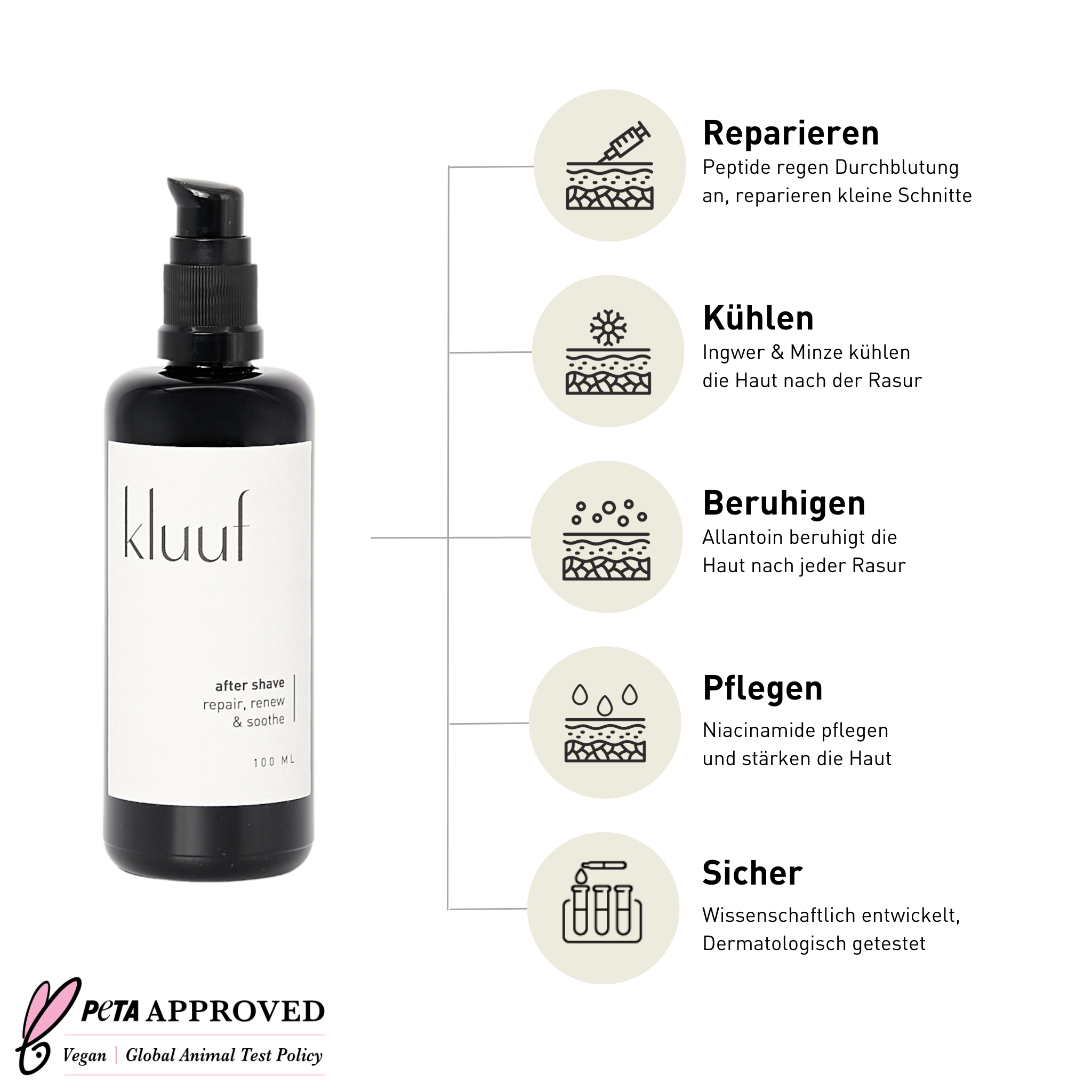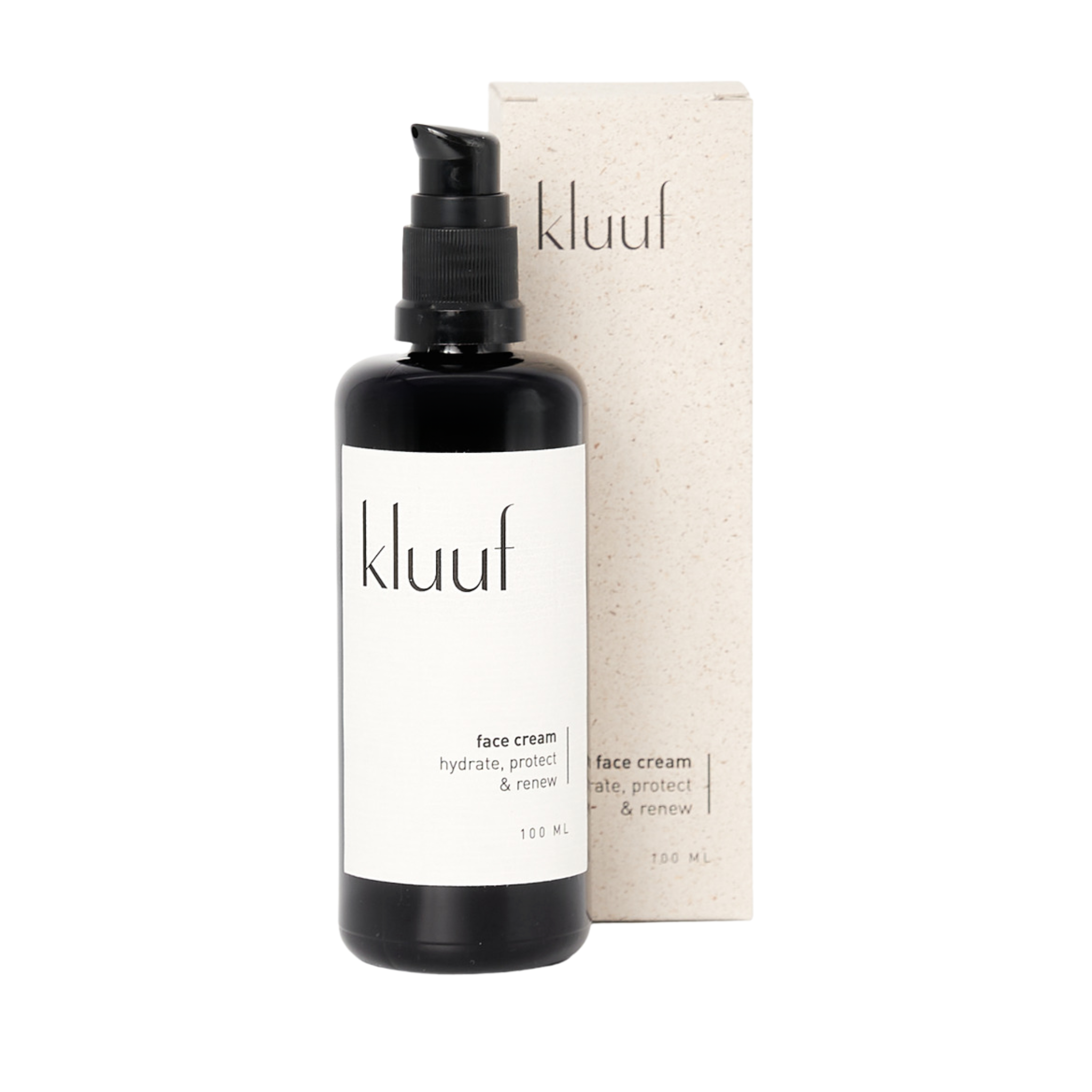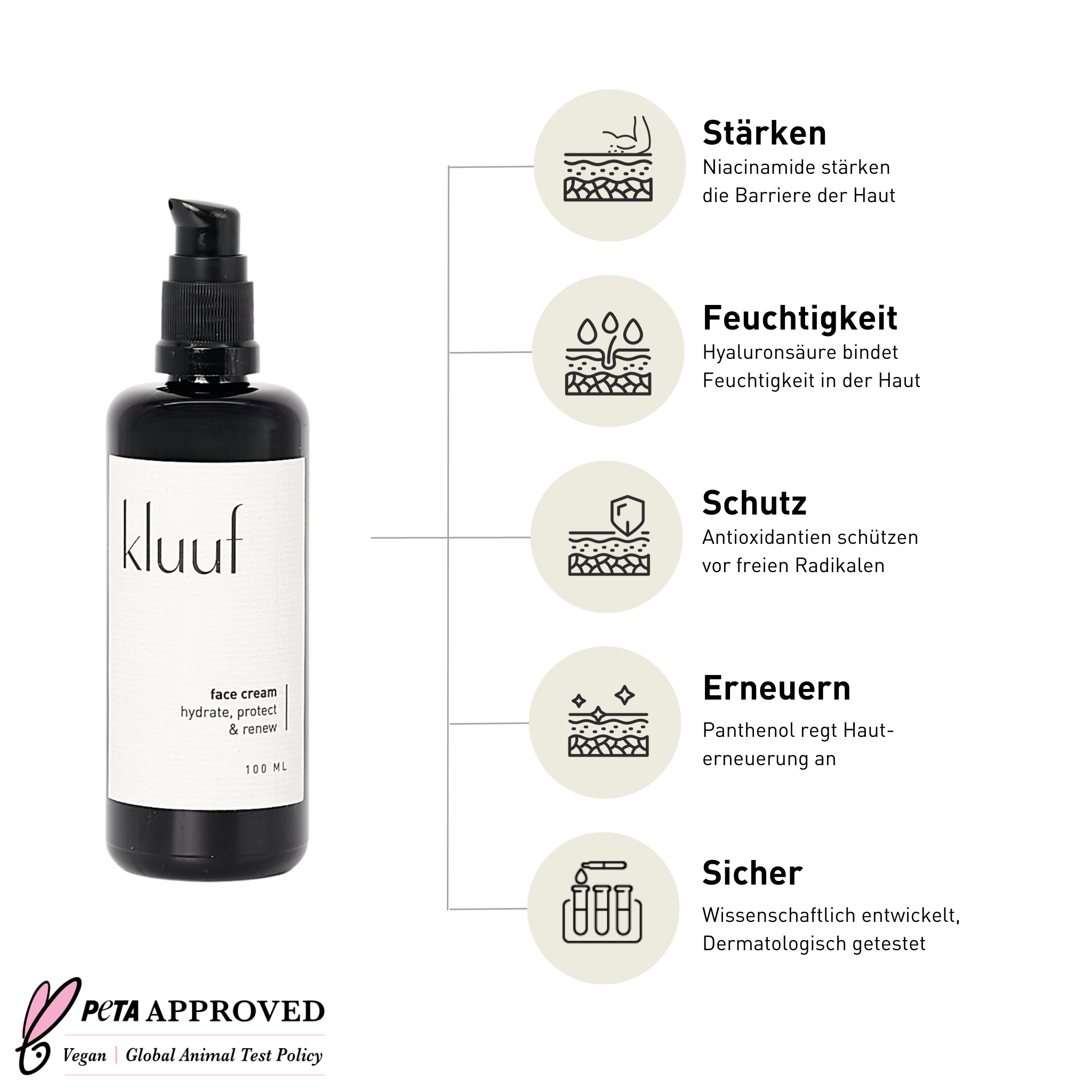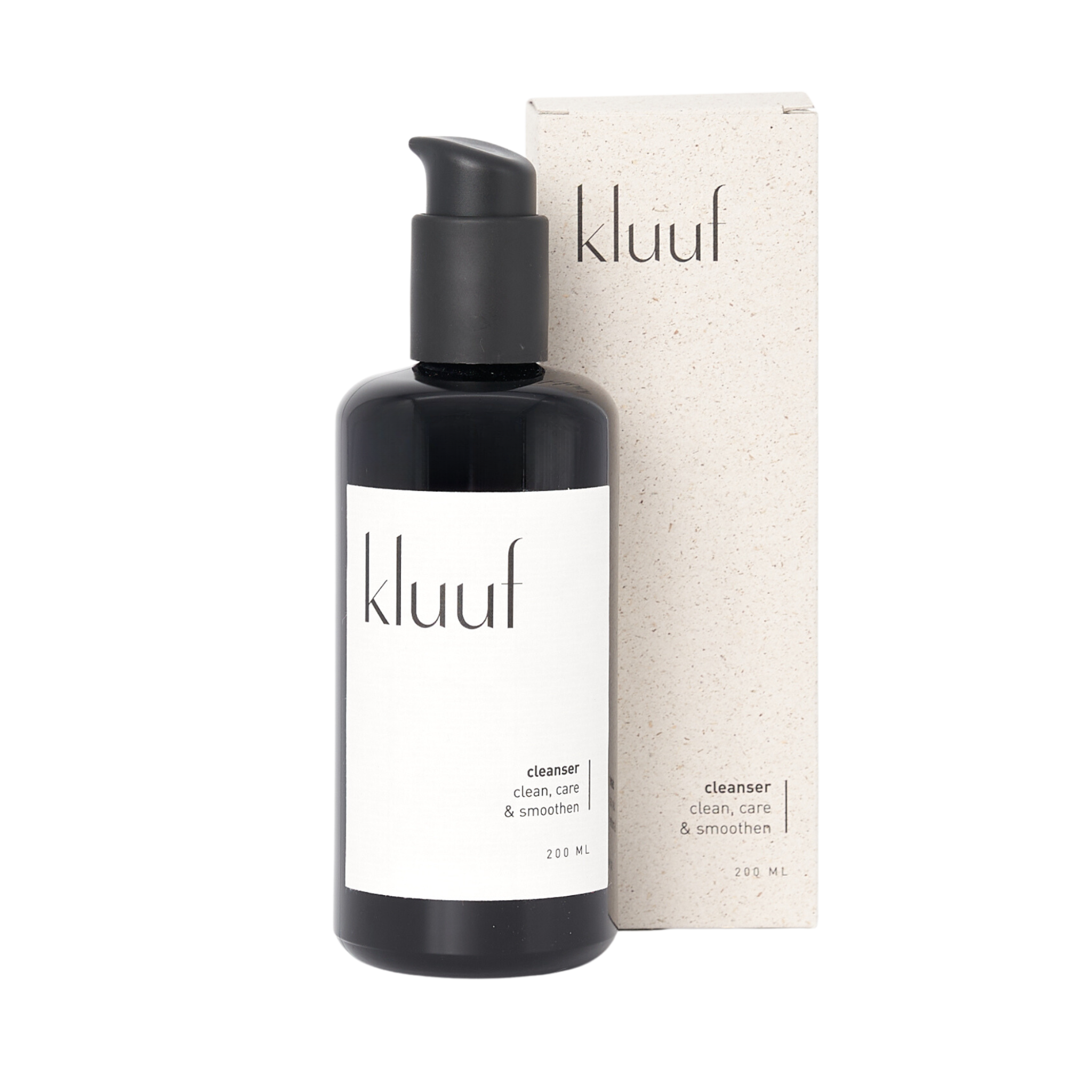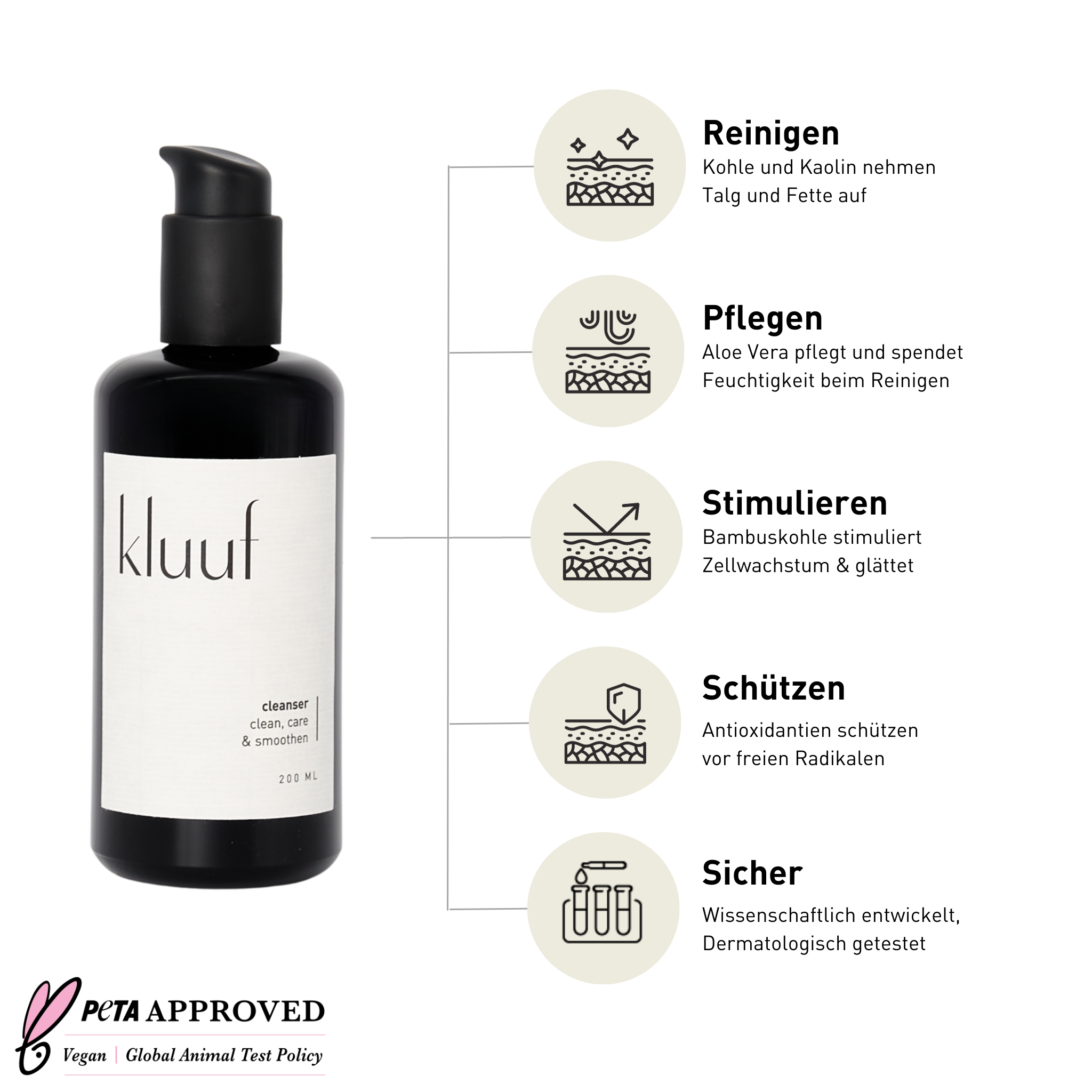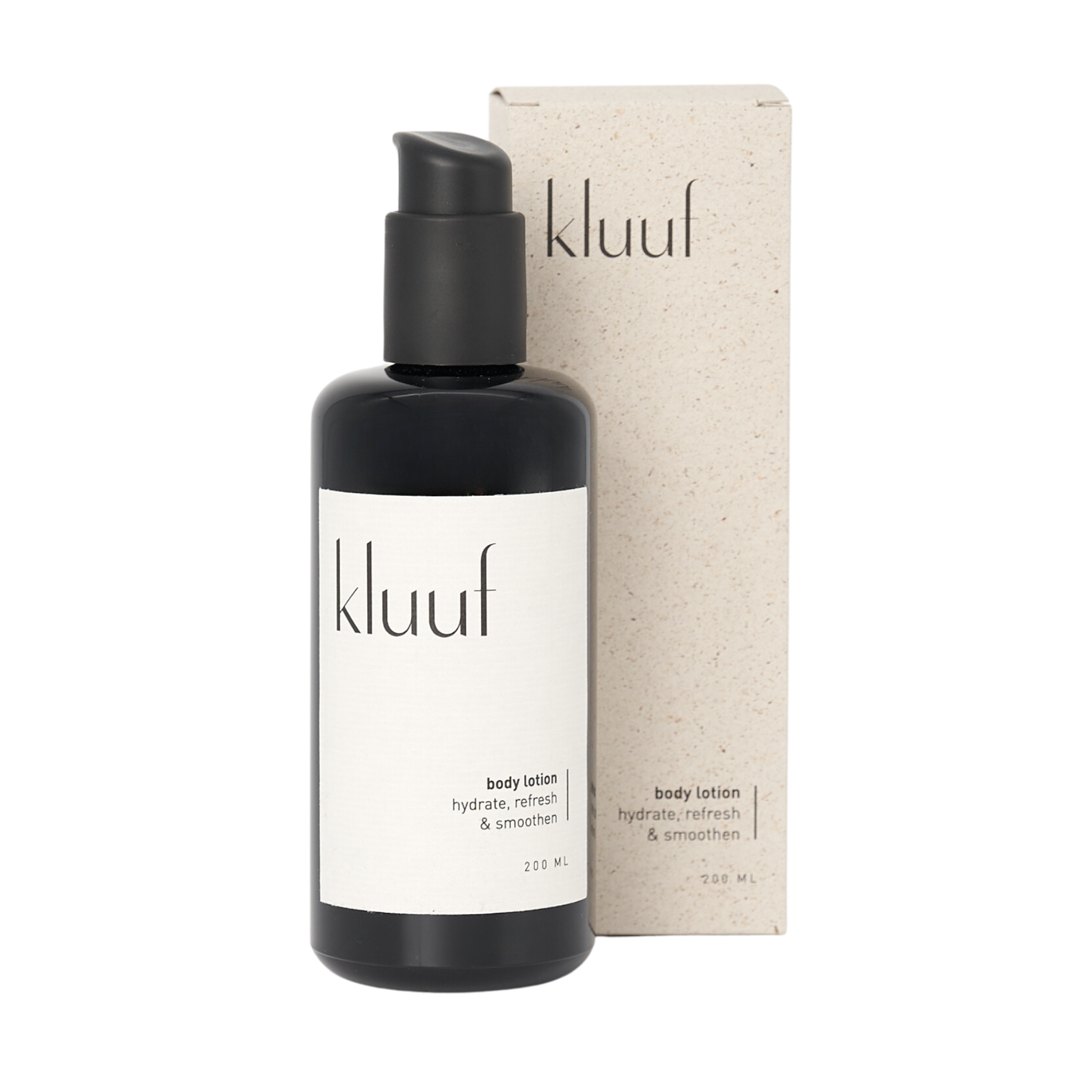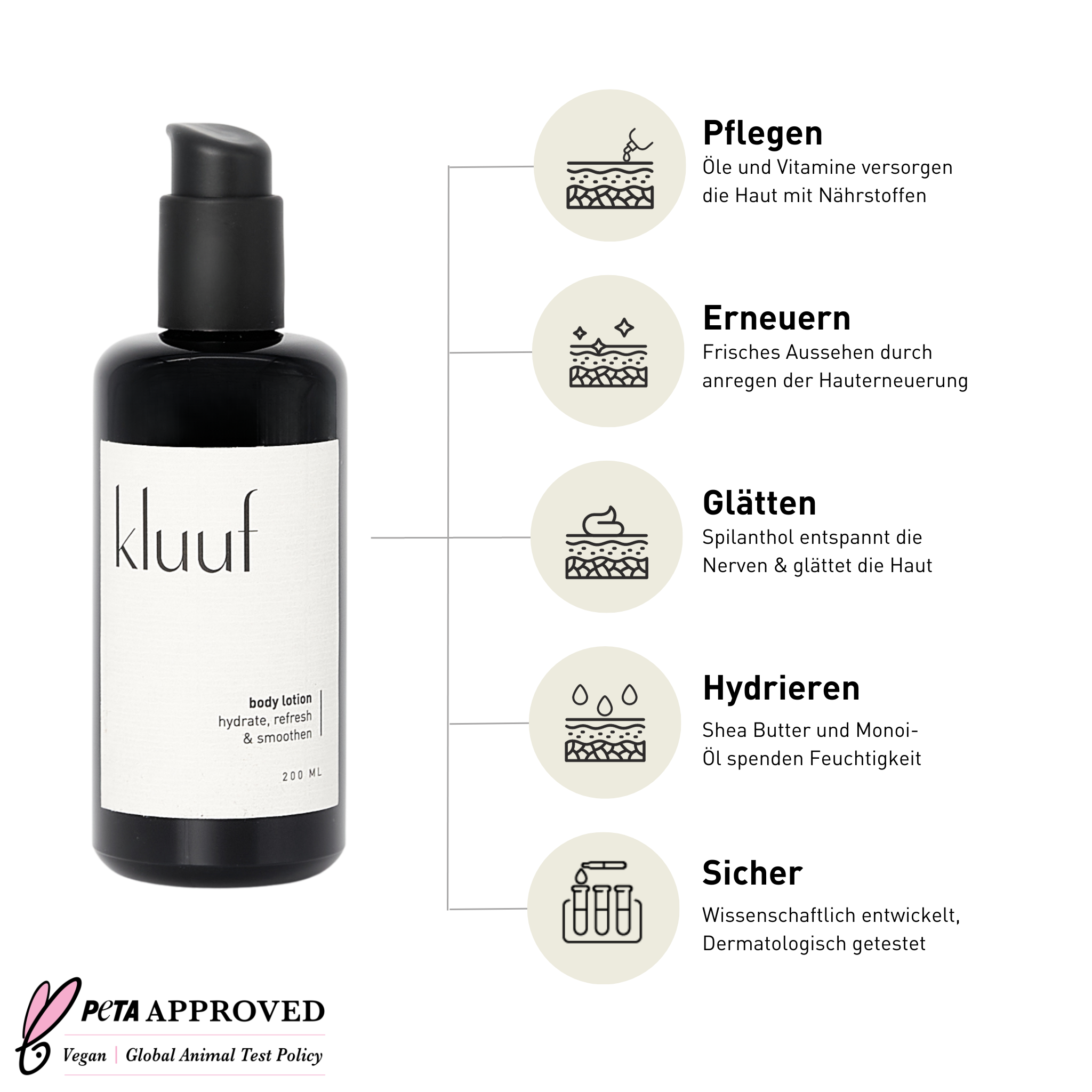No matter whether for men or women: At kluuf, we know how complicated it can be to get started with caring for your skin: Which skincare products are right for me, how does cleansing work, when do I need to apply face cream and which skin type am I?
The last question in particular, " which skin type am I", should really be at the beginning of all considerations when a man wants to start with skincare. Because the skin type helps to understand why the skin is the way it is and what needs the skin has.
Surprisingly, a large proportion of men assume that their skin type is "normal" and does not require any special care. Unsurprisingly, women are much more knowledgeable in this regard and understand their own skin type much better.
In this blog article, we explain the five different skin types, how the skin types can be easily recognized (without any complicated "skin analysis") and how men can easily determine and care for their skin.
kluuf is all about simplicity, so we would like to emphasize that while it is important to determine your skin type, it shouldn't stop you from starting your skincare routine. A high-quality and dermatologically tested cream or lotion is generally always good for the skin, regardless of skin type.
You can also familiarize yourself with the nuances after you have established an uncomplicated skincare routine and want to take your regimen to the next level.
Before we get into the five different skin types, we would like to point out that there is no good or bad, beautiful or unattractive skin type. Just like ourselves, our skin is different and beauty lies in this diversity.
Normal skin
Recognizing: Normal skin can be recognized by an even complexion, a fine-pored structure and an appearance that is well circulated.
There are no (or only small) oily patches and after washing, the skin usually does not feel irritated or dry. Sebum production is balanced and breakouts are rare.
Compatibility: This skin type tolerates most skincare products well and is forgiving if the facial cleanser or face cream is forgotten here and there.
Needs: Even normal skin needs regular care to protect the barrier and moisturize the skin. In this way, the skin retains its naturally fresh appearance and the natural protective mechanism protects against external influences such as air pollution or UV-B light.
Recommended routine: We recommend applying a protective and nourishing face cream to normal skin, daily in the morning and evening. We also recommend washing the face with a gentle cleanser in the evening and washing it thoroughly with water in the morning (the natural skin barrier of normal skin functions very well and gets unnecessarily stressed by frequent cleansing).
Note: We ourselves are not big fans of the term normal skin. All skin is normal and beautiful, which is why we actually like the term "average skin" much better!
Dry skin
Recognizing: Dry skin is easy to recognize (and sensed) as the skin looks and feels dry. In addition, dry skin is usually tight without being elastic.
The test: When dry skin is lightly pressed, it yields little and often reddens afterwards.
Dry skin lacks both moisture and lipids.
Compatibility: Dry skin quickly becomes irritated and is particularly sensitive to aggressive ingredients. These can be chemical ingredients such as low-quality alcohols, for example, but also essential oils which are frequently used in vegan natural cosmetics. Caution is also advised with strong facial cleansers and chemical peelings.
Needs: Dry skin needs two things above all:
- Moisture
- Fats
To supply the skin's need for moisture, a vegan combination of pentylene glycol, aqua and hyaluronic acid could be used. This not only supplies the skin with moisture, but also binds the moisture in the skin sustainably. Shea butter and oily oils (e.g. monoi or coconut oil) could additionally be used to nourish, protect and strengthen the skin.
Routine recommendation: For dry skin, it is advisable to only cleanse the skin with mild facial cleansers and not to use them too often. It is advisable to wash the skin with warm water in the morning and use a gentle cleanser in the evening to remove dead skin cells and protect the skin. In the morning, the skin should be nourished, moisturized and protected with a long-lasting day cream (don't forget the sunscreen). In the evening, dry skin will benefit from plenty of moisture and high-quality oils.
Incidentally, our skin also needs moisture from the inside: So make sure to drink enough water every day.
Oily skin
Recognizing: With blemished skin, the natural balance of the skin is disturbed, which is often caused by excessive sebum production. Sebum can clog pores, which can lead to pimples, blackheads and acne.
In addition to these impurities, oily skin can be easily recognized by large pores and a shiny complexion.
Important: Just because skin shows occasional pimples it does not automatically mean that you have oily skin.
Compatibility: The skin barrier function does not work optimally with blemished skin as the skin's balance is disturbed. It is important to avoid aggressive ingredients. Care products with drying properties should also be avoided, as this will only further damage the skin barrier and weaken the skin in the long term.
Needs: As impure skin has an excess of sebum and the pores tend to clog, it is important to cleanse the skin regularly. This unclogs pores and removes impurities and bacteria.
As free radicals also feel at home on oily skin, antioxidants are very welcome. Finally, it is also important to moisturize oily skin in order to strengthen the skin's basic function. However, oils or heavy fats should be avoided here.
Recommended routine: We recommend cleansing oily skin in the morning and evening with a gentle cleanser to remove excess oil and unclog pores. After cleansing, it is recommended to treat the skin with a light face cream (oily and greasy products should be avoided with this skin type). In addition, once a week exfoliation can be considered to thoroughly unclog the pores. However, this process usually attacks the skin barrier and should therefore not be carried out excessively.
If an aftershave is used, we recommend paying attention to polyhydric alcohols and avoiding drying, monohydric alcohols (more information on alcohol in skincare can be found here).
Incidentally, it is particularly important to use non-comedogenic skincare products for blemished skin in order to avoid further stressing the already stressed pores.
Mixed or combination skin
Recognizing: As the name suggests, mixed skin describes two different skin types, usually:
- normal or dry skin that shows on the cheeks and
- oily/impure skin which is particularly visible in the T-zone (forehead, nose and chin).
When determining this skin type, it is usually clear to see that the skin in the T-zone is clearly different from the skin on the cheeks.
Important: Small differences in the skin on the face do not immediately mean combination skin. It is in the nature of the skin that the different parts of the face differ here and there.
With combination skin, however, there is a clear difference between the individual areas of the face and the size of the pores also varies visibly.
Compatibility: The tolerance of combination skin is strongly dependent on the specific requirements of the skin components as described in the previous sections. As a rule, gentle and sustainable skin care products with non-comedogenic properties should be used. If you want to be on the safe side, use care products specially formulated for the different skin zones.
Needs: Unsurprisingly, the skin needs of mixed skin are based on the needs of normal (or dry) skin and oily/impure skin. For skin care, either hybrid products that meet the needs of both skin types should be used or different skin care products should be used selectively. In this case, the dry skin on the cheek could be cared for with a heavy day cream, while the T-zone is cared for with a light and less greasy lotion.
Recommended routine: For combination skin, it is advisable to cater to the individual needs of both skin types. Even if it may seem difficult, it is worth cleansing the oily T-zone twice a day and cleansing once a week, while the rest of the face is simply washed with warm water in the morning and cleansed with a cleanser in the evening. For facial care, we recommend a light cream that contains little or no oil. Instead, it is worth using hyaluronic acid, which helps to bind moisture in the skin. If the dry areas of the face require more moisture, you can moisturize with shea butter and coconut oil, for example.
Sensitive skin
Recognizing: Sensitive skin often feels tight, appears slightly red and reacts sensitively to external stressors such as wind, UV radiation, environmental pollution (e.g. smog) or dry heating air. Sensitive skin often shows symptomatic signs of dry skin (tight) and oily skin (breakouts in the form of pimples), but should not be confused with these skin types. With well balanced skincare using sustainable creams & cleansers, sensitive skin has a comparable appearance to normal skin.
Compatibility: Sensitive skin benefits from calming skin care formulations: Natural cosmetics often use aloe vera in this area, while a more modern but still vegan approach could be panthenol. However, natural ingredients can also irritate sensitive skin, so essential oils and perfume should better be avoided. If alcohol is used, only high-quality, multivalent active ingredients should be considered (read all about it here).
Needs: When caring for sensitive skin, delicacy is required: protecting and strengthening the skin barrier should be a priority. Even in the event of breakouts, the skin should only be gently cleansed and, like all skin types, sensitive skin is happy to have moisture that can be retained in the skin for the long term.
Recommended routine: We recommend washing sensitive skin with water in the morning and using a gentle and moisturizing cleanser in the evening. During the day, the skin should be cared for with a nourishing and protective cream. Sun protection is particularly important for this skin type. In the evening, sensitive skin will benefit from a long-lasting cream with plenty of moisture and soothing properties.
Additional tip: Vitamins and allantoin support the skin barrier and antioxidants "catch" free radicals (read all about it here), not only when absorbed through the skin, but also through food.
We understand that sensitive skin can seem overwhelming to care for, especially if you haven't had much exposure to skincare. But for this skin type in particular, focusing on a few high-quality & sustainable ingredients can yield great results.
Closing remarks
Naturally, skin type is genetically determined. So we don't change from dry skin to oily skin from one day to the next. Even sustainable skin care products don't facilitate a change, but they do help to reduce unwanted symptoms.
The structure and appearance of our skin changes within a skin type over time. With men in particular, fluctuating hormone levels during puberty are often responsible for acne, but this does not automatically mean that all men of that age are the "oily skin" type. Rather, the symptoms of fluctuating hormone levels in the form of pimples and blackheads also manifest themselves in dry or sensitive skin, just to give an example.
It should not be forgotten that all five skin types - whether in men or women - can also be strongly influenced by diet and lifestyle habits. A fatty diet and lack of sleep can also lead to spots or blackheads on normal skin. At the same time, consuming lots of vitamins and antioxidants can have a positive effect on all skin types, as antioxidants help to scavenge free radicals and vitamin C supports the collagen structure, among other things (you can find out how the skin is affected by what we eat & drink in this blog article).
However, a change from one skin type to another is not caused by nutrition, but it can have a lasting, positive influence.
It is important to highlight that the five skin types also differ between men and women:
For example, oily skin can look different on a man than on a woman and skincare needs can also differ. We have explained what to look out for when caring for men's skin in a separate blog article.
We hope our blog on the "five skin types in men" has helped you to determine your own skin type and gain a basic understanding of your skin's needs.
kluuf's vegan and sustainable skincare products for men have been developed by scientists with a focus on reliable results and excellent skin compatibility.
At kluuf, we value uncomplicated skincare products for men that can be used in a very short time and show reliable results.
*Excellent skin compatibility, even for sensitive skin, has been confirmed by the independent dermatological research institute SGS proderm.


